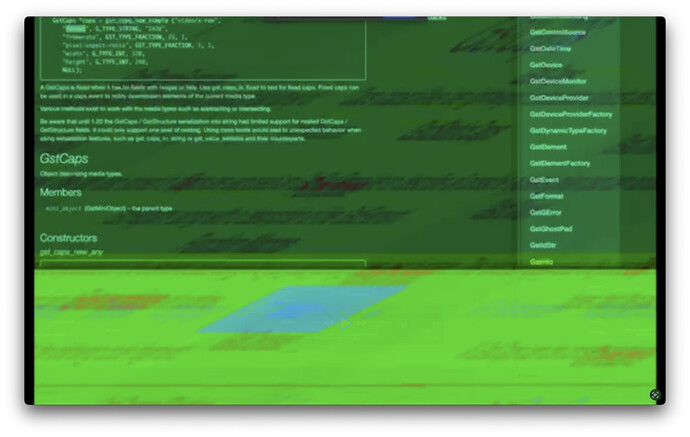I’m only trying to receive video so I can’t test with videotestsrc. But you are right! The way in which I’m doing timestamps is incorrect. With do-timestamp=true, I’m seeing some progress…
I’m getting live data (frames are sliding), but it’s coming like this and the signal need-data keeps getting triggered. Does this mean I’m pushing data slowly?
let on_track = |track_event: libwebrtc::peer_connection::TrackEvent| {
let mut pipeline_str = String::from(
"appsrc name=src is-live=true format=time do-timestamp=true ! queue !",
);
pipeline_str.push_str(
"rawvideoparse name=rawvideoparse format=i420 framerate=30/1 ! ",
);
pipeline_str.push_str("videoconvert ! autovideosink");
println!("The pipeline is:\n{}", pipeline_str);
let pipeline = gstreamer::parse::launch(&pipeline_str).unwrap();
let pipeline = pipeline.dynamic_cast::<gstreamer::Pipeline>().unwrap();
let pipeline_clone = pipeline.clone();
let appsrc = pipeline.by_name("src").unwrap();
let appsrc = appsrc.downcast::<gstreamer_app::AppSrc>().unwrap();
appsrc.connect("need-data", false, |args| {
println!("Needs data");
None
});
if let libwebrtc::prelude::MediaStreamTrack::Video(track) =
track_event.track
{
println!("Its a video track");
thread::spawn(move || {
let mut stream = NativeVideoStream::new(track);
println!("Came here");
let mut done = false;
while let Some(frame) = block_on(stream.next()) {
let i420_buffer = frame.buffer.to_i420();
//
let width = i420_buffer.width() as u32;
let height = i420_buffer.height() as
if !done {
let rawvideoparse =
pipeline.by_name("rawvideoparse").unwrap();
rawvideoparse.set_property("width", width as i32);
rawvideoparse.set_property("height", height as i32);
pipeline.set_state(gstreamer::State::Playing).unwrap();
println!("Set to playing");
}
done = t
let data_yuv = i420_buffer.data();
let strides_yuv = i420_buffer.strides()
let chroma_width = i420_buffer.chroma_width();
let chroma_height = i420_buffer.chroma_height();
let mut raw_data =
Vec::with_capacity((width * height * 3 / 2) as usize
for row in 0..height {
let start = (row * strides_yuv.0) as usize;
let end = start + width as usize;
raw_data.extend_from_slice(&data_yuv.0[start..end]);
// Copy U plane
for row in 0..chroma_height {
let start = (row * strides_yuv.1) as usize;
let end = start + chroma_width as usize;
raw_data.extend_from_slice(&data_yuv.1[start..end]);
// Copy V plane
for row in 0..chroma_height {
let start = (row * strides_yuv.2) as usize;
let end = start + chroma_width as usize;
raw_data.extend_from_slice(&data_yuv.2[start..end]);
}
let gst_buffer = gstreamer::Buffer::from_mut_slice(raw_data);
//
if let Err(e) = appsrc.push_buffer(gst_buffer) {
println!("Error {:?}", e);
}
println!("Pushed");
}
});
thread::spawn(move || {
let bus = pipeline_clone.bus().unwrap();
for msg in bus.iter_timed(gstreamer::ClockTime::NONE) {
match msg.view() {
MessageView::Eos(_) => {
println!("End of stream");
}
MessageView::Error(e) => {
println!("stream error {}", e);
}
_ => (),
}
}
});
}
}
I followed your advice and used gst::Buffer::from_mut_slice(). I’m not sure if it’s possible to directly pass the input data as I’m not really knowledgeable about this.
I was using webrtcbin before this. However, due to it not supporting stopping transceivers in SDP negotiation and artifacting with webrtcsrc, I have to go down this route which I wish didn’t have to ![]()
